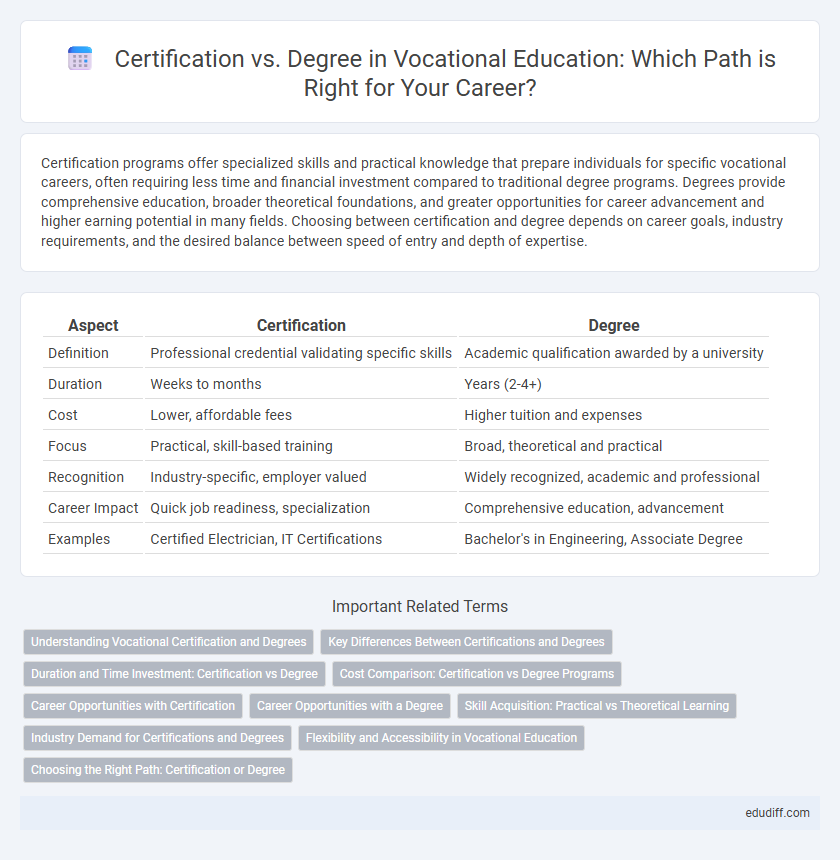Certification programs offer specialized skills and practical knowledge that prepare individuals for specific vocational careers, often requiring less time and financial investment compared to traditional degree programs. Degrees provide comprehensive education, broader theoretical foundations, and greater opportunities for career advancement and higher earning potential in many fields. Choosing between certification and degree depends on career goals, industry requirements, and the desired balance between speed of entry and depth of expertise.
Table of Comparison
| Aspect | Certification | Degree |
|---|---|---|
| Definition | Professional credential validating specific skills | Academic qualification awarded by a university |
| Duration | Weeks to months | Years (2-4+) |
| Cost | Lower, affordable fees | Higher tuition and expenses |
| Focus | Practical, skill-based training | Broad, theoretical and practical |
| Recognition | Industry-specific, employer valued | Widely recognized, academic and professional |
| Career Impact | Quick job readiness, specialization | Comprehensive education, advancement |
| Examples | Certified Electrician, IT Certifications | Bachelor's in Engineering, Associate Degree |
Understanding Vocational Certification and Degrees
Vocational certification provides practical skills and industry-specific knowledge tailored for immediate employment and skill verification in trades such as welding, electrical work, or healthcare. Degrees, typically awarded by colleges or universities, offer a broader educational foundation with theoretical knowledge alongside practical training, often required for advanced career opportunities or management roles. Understanding the differences helps individuals align their educational choices with career goals, balancing hands-on expertise versus comprehensive academic credentials.
Key Differences Between Certifications and Degrees
Certifications provide specialized skills and are typically earned faster, focusing on practical, job-ready competencies, while degrees offer comprehensive theoretical knowledge over several years, supporting broader career opportunities. Certifications often require specific exams or demonstrations of expertise, whereas degrees entail coursework, research, and academic assessments. Employers may prefer certifications for immediate skill validation, but degrees are valued for foundational education and critical thinking development.
Duration and Time Investment: Certification vs Degree
Certification programs typically require a shorter duration, often ranging from a few weeks to several months, enabling quicker entry into the workforce. Degree programs demand a significant time investment, usually spanning two to four years, depending on the level of education pursued. The shorter timeframe of certifications allows for rapid skill acquisition, while degrees provide comprehensive knowledge and broader academic exposure.
Cost Comparison: Certification vs Degree Programs
Certification programs often present a significantly lower cost compared to traditional degree programs, with many certifications available for a few hundred to a few thousand dollars, while degrees can range from tens to hundreds of thousands of dollars. The shorter duration of certification courses, usually spanning weeks to months, reduces not only tuition fees but also ancillary expenses such as textbooks and housing. Employers increasingly recognize industry-specific certifications as valuable credentials, offering cost-effective pathways to career advancement without the financial burden of a full degree program.
Career Opportunities with Certification
Certification programs often provide specialized skills that align directly with industry requirements, increasing employability and enabling faster entry into the workforce. Many employers prioritize certifications as proof of practical expertise and commitment to professional development, especially in technical fields like IT, healthcare, and trades. Certification holders frequently access targeted career opportunities with potential for higher wages and advancement without the extended time and cost of traditional degrees.
Career Opportunities with a Degree
Earning a vocational degree significantly expands career opportunities by providing a comprehensive education that combines theoretical knowledge with practical skills. Degrees often open doors to advanced positions, higher salaries, and eligibility for professional certifications that certifications alone may not offer. Employers frequently prioritize degree holders for leadership roles and specialized fields, making a degree a valuable investment for long-term career growth.
Skill Acquisition: Practical vs Theoretical Learning
Certification programs emphasize hands-on skill acquisition through practical training tailored to specific vocational tasks, enabling immediate application in the workplace. Degrees often offer comprehensive theoretical knowledge that supports a broader understanding of concepts but may lack intensive practical experience. Employers seeking job-ready candidates typically value certifications for their direct skill relevance, while degrees provide foundational insights that complement practical abilities.
Industry Demand for Certifications and Degrees
Industry demand increasingly favors certifications in vocational fields due to their focus on specific skills and practical knowledge. Certifications often lead to faster employment and higher job retention rates compared to degrees, especially in technology, healthcare, and skilled trades. Employers prioritize certifications for their ability to verify up-to-date competencies and adapt quickly to evolving industry standards.
Flexibility and Accessibility in Vocational Education
Vocational certification programs offer greater flexibility by providing shorter, targeted courses that accommodate varied schedules and immediate workforce entry, unlike traditional degree programs that require longer, fixed timelines. Accessibility is enhanced through online and hybrid formats in vocational certifications, making skill acquisition feasible for working adults and underserved populations. This adaptability aligns vocational education with evolving industry demands, promoting continuous learning without the barriers often associated with degree programs.
Choosing the Right Path: Certification or Degree
Choosing between certification and degree depends on career goals, industry demands, and time investment. Certifications offer specialized skills and quicker entry into specific trades, ideal for vocational fields requiring up-to-date expertise. Degrees provide comprehensive knowledge and broader opportunities, essential for careers valuing academic qualifications and long-term growth.
Certification vs Degree Infographic

 edudiff.com
edudiff.com